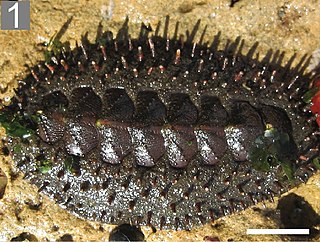
Chitons are marine molluscs of varying size in the class Polyplacophora, formerly known as Amphineura. About 940 extant and 430 fossil species are recognized.

The gumboot chiton, also known as the giant western fiery chiton or giant Pacific chiton, is the largest of the chitons, growing to 36 cm (14 in) and capable of reaching a weight of more than 2 kg (4.4 lb). It is found along the shores of the northern Pacific Ocean from Central California to Alaska, across the Aleutian Islands to the Kamchatka Peninsula and south to Japan. It inhabits the lower intertidal and subtidal zones of rocky coastlines. The gumboot chiton's appearance has led some tidepoolers to refer to it, fondly, as the "wandering meatloaf". The name "gumboot chiton" seems to derive from a resemblance to part of a rubber Wellington boot or "gum rubber" boot.

Chiton glaucus, common name the green chiton or the blue green chiton, is a species of chiton, a marine polyplacophoran mollusk in the family Chitonidae, the typical chitons. It is the most common chiton species in New Zealand. Chiton glaucus is part of a very primitive group of mollusc with evidence of being present in up to 80 million years of the fossil record.
A valve is each articulating part of the shell of a mollusc or another multi-shelled animal such as brachiopods and some crustaceans. Each part is known as a valve or in the case of chitons, a "plate". Members of two classes of molluscs, the Bivalvia (clams) and the Polyplacophora (chitons), have valves.

Ischnochiton is a genus of polyplacophoran mollusc.

Mollusca is the second-largest phylum of invertebrate animals, after Arthropoda; members are known as molluscs or mollusks. Around 76,000 extant species of molluscs are recognized. The number of fossil species is estimated between 60,000 and 100,000 additional species. The proportion of undescribed species is very high. Many taxa remain poorly studied.

The hairy chiton is a species of chiton in the family Chaetopleuridae. It is a marine mollusc.

Mopalia ciliata is a chiton in the genus Mopalia, commonly known as the hairy chiton. It is a medium-sized marine mollusc up to 5.0 cm (2.0 in) in length. It is oval shaped with 8 separate, moderately elevated, overlapping ridged valves on its dorsal surface. Hairy chitons can be found along the coast of North America.

Ischnochitonidae is a family of polyplacophoran mollusc belonging to the superfamily Chitonoidea.

Stenoplax is a genus of polyplacophoran molluscs in the family Ischnochitonidae.

Plaxiphora albida, the white Plaxiphora chiton, is a species of chiton in the family Mopaliidae.

Cryptoplax iredalei, the Iredale's fleshy-chiton, is a species of chiton in the genus Cryptoplax.

Ischnochiton elongatus, the lengthened chiton or elongate chiton, is a species of chiton in the family Ischnochitonidae.

Lepidochitona cinerea, known by the common names common chiton or gray chiton, is a species of chiton, a marine polyplacophoran mollusc in the family Tonicellidae.

Chiton politus, the tulip chiton, is a medium-sized polyplacophoran mollusc in the family Chitonidae, found on the coast of southern Africa.

Enoplochiton echinatus is a Southeast Pacific species of edible chiton, a marine polyplacophoran mollusc in the family Chitonidae, the typical chitons.














